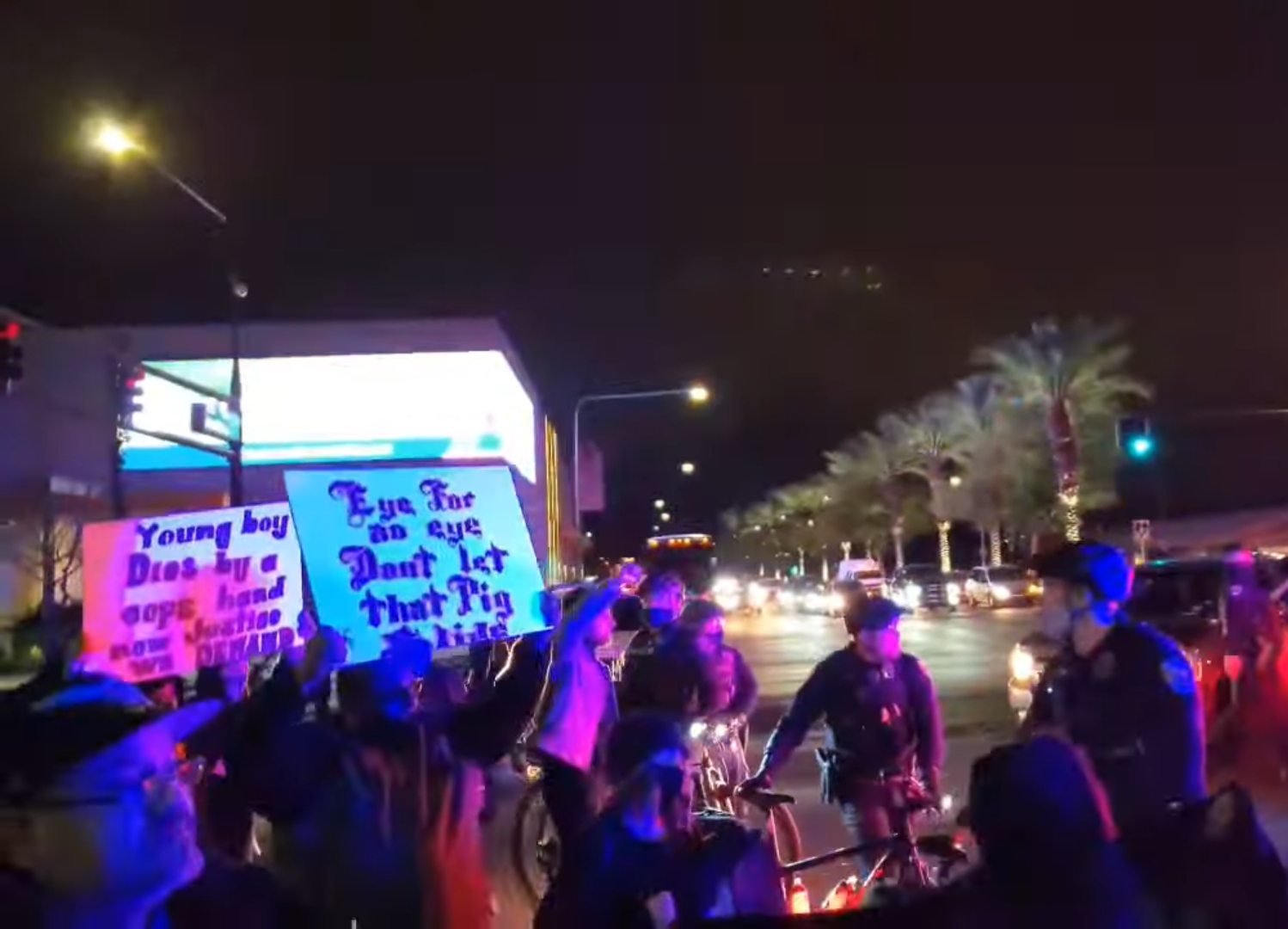
Darien Barrett

Audio By Carbonatix
On March 12, Darien Barrett marched with a small group of protesters down a boulevard in Chandler. It had been two months since the death of seventeen-year-old Anthony Cano, who was shot in the back by a Chandler officer. And still, each week, the group was out in the streets, calling for justice for his death.
The rally began without incident. But by the end of the night, Barrett was one of five people arrested and charged by the city for multiple misdemeanors. Almost all were well-known police accountability activists in the Phoenix area.
Now, attorneys for Barrett and another activist arrested that night, Phil Martinez, have filed $300,000 claims against the city of Chandler, signaling an impending lawsuit. The claims allege that the two were politically targeted by Chandler police, subjected to excessive force in their arrests – and then given toilet water to drink while in custody.
It amounted to, attorneys for the two write, an “apparent effort to disable the movement that was attempting to hold the Chandler Police Department accountable for the killing of a teenager.”
By the time Barrett and Martinez were arrested, Phoenix police were already under fire for their attempt to charge dozens of local protesters with street gang activity. Prosecutors claimed the protesters were members of the now-notorious fictional “ACAB gang,” which wore all black and carried umbrellas.
It appears Chandler police drew inspiration from Phoenix in conducting their own arrests of activists. In a probable cause statement for Barrett’s arrest, which was obtained by Phoenix New Times, officers noted that he was “holding an umbrella and wearing all black.”
That information, the officer wrote, was “relayed” to the bike cops that then descended on the group.
Martinez and Barrett’s attorney, Steve Benedetto – who also represented many of the protesters that Phoenix hit with gang charges – told New Times that the case felt all too familiar, although the charges that the activists faced were low-level by comparison.
“What we should have seen was a correction by other police departments to make sure that they were more careful to safeguard people’s constitutional rights. And what we saw in this case was exactly the opposite,” he said. “[Chandler police] targeted protesters, they arrested them, and then they tried to charge them with offenses they didn’t commit.”
Unlike the Phoenix gang charges, however, which were ultimately dropped, all five protesters arrested in March were prosecuted by the city of Chandler. They were each charged with interfering with police, obstructing a thoroughfare, and, in Tice’s case, resisting arrest. Four of the activists – Barrett, Tice, Kai Graham, and Richard Weed – accepted plea deals.
In their writeups of the incident, police said they had arrested the five because they appeared to be “instigators” and protest “leaders.” But several of the activists were also already known to police in the Phoenix area. Barrett, for instance, runs the YouTube channel Tempe Against Police Violence, where he regularly livestreams the activities of Valley cops. He’s part of a network of local “copwatchers,” who aim to hold police accountable by keeping them on camera – and often embarrassing them in the process.
“We’ve seen a pattern and practice of Valley police departments surveilling prominent activists,” Benedetto said. “This case looks like one where that probably happened.”
On the night of the arrests, Barrett and the others were marching to the public park where Cano was killed, occupying a traffic lane on Arizona Avenue. According to Benedetto, protesters had complied with police orders to leave one lane open.
But, two blocks from the park, police formed a skirmish line, preventing the group from moving forward – merely an attempt to move the group out of the roadway and free up traffic, officers claimed in probable cause statements.
Much of the confrontation that followed was filmed by activists and captured in body camera footage that was later released. The videos show that as the group pressed forward along Arizona Avenue, police began the arrests: First, they grabbed Phil Martinez, who was leading the group, carrying a bullhorn. Then, officers turned to Barrett – who did nothing but walk with the group that night, according to both police and protesters’ accounts of the incident.
Body camera footage of Barrett’s arrest shows an officer dragging him roughly by his backpack on the street. The officer then slams his head on the asphalt and kneels on him while another handcuffs him. Barrett begs the officer to move off his head eight times before he’s forced to stand.
“Why were you so rough on me?” he asks them. The officers do not reply.
Martinez, meanwhile, says he was given a “rough ride” as he was driven to the station – law enforcement slang for the practice of driving recklessly with a handcuffed person in the backseat, throwing them around the vehicle.
Then, both claim, officers gave them toilet water when they asked for something to drink, as they were being booked, which they refused.
In addition to unlawful arrest and excessive force, the claims also allege malicious prosecution, assault and battery, and intentional infliction of emotional distress. “The emotional wounds of that evening continue to fester,” Benedetto wrote.
City of Chandler spokesperson Matt Burdick told New Times that the city could not comment on the cases, due to pending litigation.
Chandler police spokesperson Jason McClimans said that the department would also not be commenting. Asked whether the arrests were ever investigated internally by the department, he declined to answer.